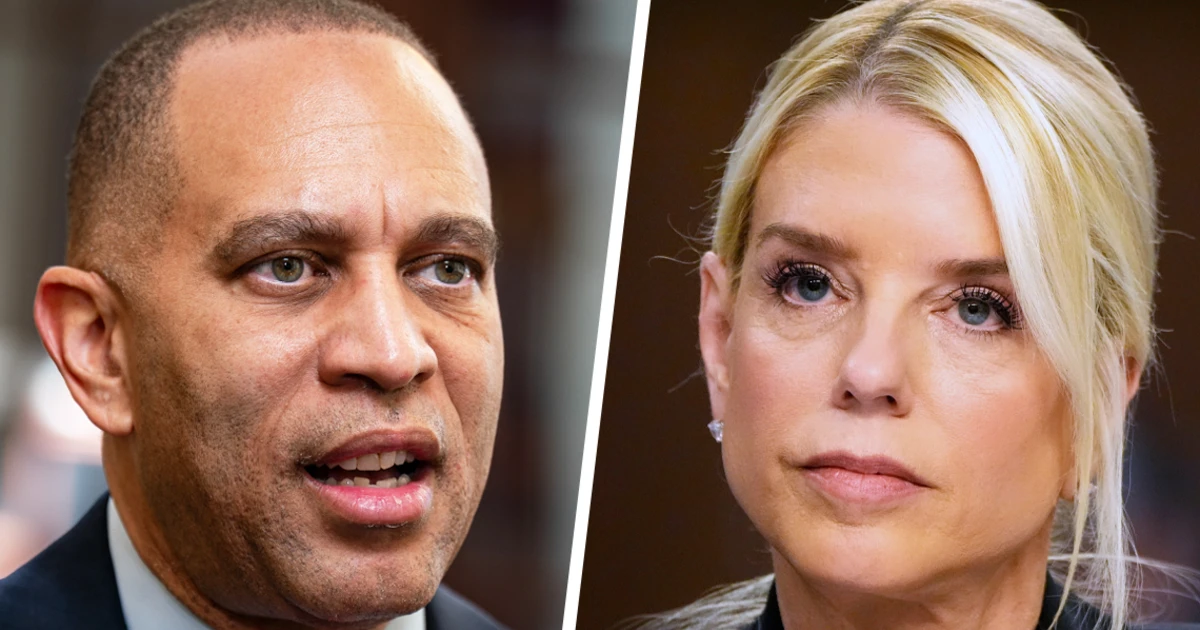Copyright MSNBC

Earlier this month, the FBI’s National Threat Operations Center received a tip: A TikTok user said he wanted Attorney General Pam Bondi “dead or alive” — but “preferably dead.” The social media post was accompanied by a photo of Bondi with a “sniper scope red dot” on her forehead, according to court documents. The tip was described to the FBI as a “murder-for-hire.” A poster was offering a $45,000 reward. A week later and with the help of TikTok, Google and Comcast — the parent company of MSNBC — the FBI arrested 29-year-old Tyler Avalos of Minnesota, who allegedly identifies as an “anarchist.” The Justice Department’s Oct. 16 complaint charges Avalos with creating an “online post containing a threat to injure,” a federal crime punishable by up to 20 years in prison. Avalos was released from federal detention last week on multiple conditions. Among other limits, he must comply with GPS monitoring, obey a curfew, refrain from any alcohol use, cooperate with a mental health assessment and relinquish any firearms. He is also prohibited from possessing or using any computer or other online device without the express permission of federal probation and pretrial services officials. A man in upstate New York allegedly threatened to kill House Minority Leader Hakeem Jeffries. “I cannot allow this terrorist to live,” one message read, according to the criminal complaint. “Even if I am hated I must eliminate him. I will kill him for the future.” Avalos also has a multistate criminal history, including convictions for stalking, domestic battery and domestic assault between 2016 and 2022. Nine days after receiving the tip about Avalos’ TikTok about Bondi, the FBI said it received another tip: An upstate New York man had sent text messages allegedly threatening to kill House Minority Leader Hakeem Jeffries. “I cannot allow this terrorist to live,” one message read, according to the criminal complaint. “Even if I am hated I must eliminate him. I will kill him for the future.” The next day, Christopher Moynihan was arrested by New York State police and charged with making a terroristic threat, a state crime that carries a penalty of between two to seven years behind bars. The case is being handled by the Dutchess County District Attorney, though it is unclear how and why the FBI tip was transmitted to state authorities. Moynihan is a convicted Jan. 6 rioter who was sentenced to 21 months in prison. He served 12 months before he was released pending an appeal. He was later pardoned by President Donald Trump, who himself was the target of two assassination attempts, following other threats and attacks on political figures — including former House Speaker Nancy Pelosi, whose husband became the unintended victim. In connection with Moynihan’s recent arrest, a town court issued an order prohibiting Moynihan from owning or possessing any firearms at least through May 2026, and granting law enforcement the right to search him and his home. Nevertheless, he was released from state custody after posting bail last week. Court documents also reflect that a town judge imposed no other conditions on Moynihan’s release, instead finding he qualified for “the least restrictive kind and degree of control or restriction necessary to reasonably assure the defendant’s return to court” on Nov. 6. Each of these threats directed at prominent officials in their respective political parties has been handled differently — and with meaningful disparities in the potential sentences they may face. It’s not a requirement that the DOJ investigate, much less prosecute, all cases involving threats against federal officials, but when looking at the cases here, I wondered: Why wouldn’t it? One possibility, as suggested by former federal prosecutor Mike Romano, is that Justice Department lawyers no longer feel secure charging those who, like Moynihan, were convicted and then pardoned of Jan. 6-related crimes, even when accused of unrelated crimes. Just this week, MSNBC’s Ken Dilanian reported that two DOJ prosecutors were put on leave after requesting a 27-month sentence for a pardoned Jan. 6 offender. That man was convicted earlier this year on charges that involved him taking illegal guns and many rounds of ammunition near the home of former President Barack Obama, whose address Trump had shared on social media. Yet, there are multiple reasons the DOJ would want to take the lead. First, given that Jeffries is a federal official, one might think federal law enforcement has a unique interest in prosecuting the threat and deterring other similar crimes. Federal law specifically prohibits threatening to murder a federal official with the intent to intimidate or interfere with their duties — or with the intent to retaliate against them for the past performance of their job. And a violation of that federal statute carries as many as 10 years in prison, plus a fine. Second, the threat against Jeffries — while made by text to an unknown person, not directly to Jeffries or over social media — was direct, specific and, in light of additional information, credible. The anonymous person who reported the Jeffries threat to the FBI also, according to court filings, said they were “concerned over [Moynihan’s] increased narcotic abuse and homicidal ideations.” State authorities also flagged — in requesting the emergency protective order — that someone in Moynihan’s household appears on the state assault weapons registry and owns an AK47, thereby giving Moynihan access to a deadly weapon. Third, the threat occurred against the backdrop of a rapidly escalating threat environment for political figures writ large and members of Congress in particular. According to the U.S. Capitol Police, in 2024 alone, there were more than 9,400 threats against Members of Congress, more than double the rate from 2017. As a result, the Capitol Police in January 2024 hired its own lawyers to work with the DOJ ahead of the election to prosecute “the unique types of threat cases faced by the Congress.” Given all of this, some legal experts consulted by MSNBC were puzzled by the state’s taking the lead, calling the move “odd” and “bizarre,” and noting that as evidenced by Moynihan’s release on bail, it’s more difficult to keep defendants in state custody versus federal. But one former U.S. attorney, while noting “it’s weird” that the only charges against Moynihan so far have come from the state, also cautioned against concluding that the Justice Department and FBI have declined further involvement in the Jeffries matter. They can always jump in, after all. For their part, neither the FBI nor the Justice Department are commenting on the case or how it ended up with the state. Still, it’s not because DOJ lacks experience bringing — or even trying — these cases. With help from those Capitol Police-hired lawyers, the DOJ has not only successfully convicted several defendants who have threatened members of Congress, but it has also, in recent months, charged those who have threatened members of both sides of the political aisle. The Justice Department — under both the Biden and Trump administrations — has handled several cases involving death threats against Rep. Eric Swalwell, D-Calif., an outspoken Trump critic and one of the House managers during the president’s second impeachment, including one charged this past summer. Last summer, U.S. Attorney for the District of Columbia Jeanine Pirro charged a Maryland resident and longtime Voice of America employee with making threats against Rep. Marjorie Taylor Greene, her staff and their family members. That case is ongoing. The day after the tip about the threat against Bondi trickled into the FBI’s call center, the attorney general stood at a podium in Tampa, flanked by law enforcement officials and the conservative influencer Benny Johnson. Johnson had received a violent death threat through the mail, and the feds had traced the letter to a man in California, whose arrest Bondi announced. Invoking not only the Charlie Kirk murder but also that of Minnesota State Rep. Melissa Hortman and the attempted assassination-by-arson of Pennsylvania Gov. Josh Shapiro — both Democrats — Bondi decried “a horrific cycle of political violence.” Bondi also called the man arrested in the Johnson threats a “left-wing radical” before telling the press gathered, “If anyone is sending a threatening communication through the mail like they did to Benny Johnson, we’re going to find them and we’re going to prosecute them.” “It doesn’t matter what side of the aisle you’re on.”



